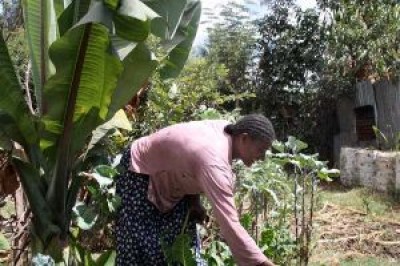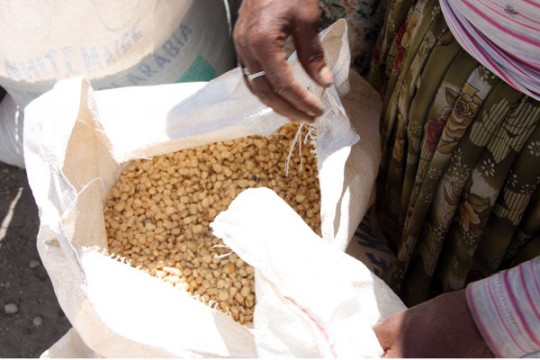Ethiopia: HIV+ Mother Pulls Family Back from Brink
Ethiopia: HIV+ Mother Pulls Family Back from Brink
With the help of WFP’s food support and livelihood assistance programmes, Belaynish Dabe and her HIV-positive husband no longer struggle to feed themselves and their children. WFP’s food support to people living with HIV helps ameliorate the double burden of lack of income and deteriorating health.

For more than a year, Belaynish and her family have been able to get by without food assistance, as she and her husband are strong enough to grow their own food/Copyright: WFP/ Katharina Weltecke
DEBRE ZEIT–Belaynish Dabe, an HIV-positive mother of six children, used to struggle to feed herself and her children due to a lack of regular income.
She grew only maize, which she could harvest once a year—not enough to feed the whole family. When her HIV-positive husband became severely weakened from the disease, the neighbours used to say, “Why are you even taking him to the hospital? It seems that his death cannot be prevented anymore.”
But Belaynish remained optimistic.
She and her husband began receiving nutritious food rations from WFP for six months. With a full stomach, they were able to improve their nutritional status, regain their strength and better adhere to their treatment. WFP’s food support to people living with HIV, which includes wheat, corn-soya blend, fortified vegetable oil and pulses, helps ameliorate the double burden of lack of income and deteriorating health.
In addition to receiving food rations, Belaynish began participating in WFP’s livelihood assistance programmes, which act as social safety nets for people affected by HIV. She is one of 2,800 people living with HIV in Debre Zeit, where WFP, together with the NGO RATSON, supports the HIV-affected population through community-led activities and trainings like urban gardening.

In Ethiopia, the rate of people living with HIV in urban centres is up to 7.4% – much higher than in rural areas. Throughout the country, WFP supports 126,000 people affected by HIV with food support and livelihood assistance to help them return to a socially and economically stable life.
For more than a year now, Belaynish and her family have not had to rely on food assistance to survive, as she and her husband are strong enough to grow their own food. “I used to struggle before, when we only had tomatoes,” said Belaynish. Now, they are able to sustain themselves through their own urban garden: bananas, peppers, cabbage and sugar cane. Moreover, they have a surplus that they sell to their neighbours. Last year they were even able to buy a cow with their savings, who just gave birth to a calf. What’s more, her children are able to attend school.
Now, Belaynish and her husband go to the hospital only once every two months now and have resumed their normal lives. “Thank God, we’re alive,” she says.
Belaynish is proud of her achievements, but she’s not done yet. Belaynish’s next goal is to further diversify her income by planting and selling tree seedlings.
###
About United Nations World Food Programme (WFP)
Fighting hunger worldwide

The World Food Programme is the world’s largest humanitarian agency fighting hunger worldwide.
“In emergencies, we get food to where it is needed, saving the lives of victims of war, civil conflict and natural disasters. After the cause of an emergency has passed, we use food to help communities rebuild their shattered lives.”
WFP is part of the United Nations system and is voluntarily funded.
Born in 1961, WFP pursues a vision of the world in which every man, woman and child has access at all times to the food needed for an active and healthy life. We work towards that vision with our sister UN agencies in Rome — the Food and Agriculture Organization (FAO) and the International Fund for Agricultural Development (IFAD) — as well as other government, UN and NGO partners.
In 2011 we aim to reach more than 90 million people with food assistance in more than 70 countries. Around 10,000 people work for the organization, most of them in remote areas, directly serving the hungry poor.
WFP’s five objectives:
- Save lives and protect livelihoods in emergencies
- Prepare for emergencies
- Restore and rebuild lives after emergencies
- Reduce chronic hunger and undernutrition everywhere
- Strengthen the capacity of countries to reduce hunger
WFP’s Mission statement
WFP is the food aid arm of the United Nations system. Food aid is one of the many instruments that can help to promote food security, which is defined as access of all people at all times to the food needed for an active and healthy life. ¹ The policies governing the use of World Food Programme food aid must be oriented towards the objective of eradicating hunger and poverty. The ultimate objective of food aid should be the elimination of the need for food aid.
Targeted interventions are needed to help to improve the lives of the poorest people – people who, either permanently or during crisis periods, are unable to produce enough food or do not have the resources to otherwise obtain the food that they and their households require for active and healthy lives.
Consistent with its mandate, which also reflects the principle of universality, WFP will continue to:
- use food aid to support economic and social development;
- meet refugee and other emergency food needs, and the associated logistics support; and
- promote world food security in accordance with the recommendations of the United Nations and FAO.
The core policies and strategies that govern WFP activities are to provide food aid:
- to save lives in refugee and other emergency situations;
- to improve the nutrition and quality of life of the most vulnerable people at critical times in their lives; and
- to help build assets and promote the self-reliance of poor people and communities, particularly through labour-intensive works programmes.
###
> United Nations (UN).
 The United Nations was established on 24 October 1945 by 51 countries committed to preserving peace through international cooperation and collective security. Today, nearly every nation in the world belongs to the UN: membership totals 192 countries.
The United Nations was established on 24 October 1945 by 51 countries committed to preserving peace through international cooperation and collective security. Today, nearly every nation in the world belongs to the UN: membership totals 192 countries.
When States become Members of the United Nations, they agree to accept the obligations of the UN Charter, an international treaty that sets out basic principles of international relations. According to the Charter, the UN has four purposes:
- to maintain international peace and security;
- to develop friendly relations among nations;
- to cooperate in solving international problems and in promoting respect for human rights;
- and to be a centre for harmonizing the actions of nations.
###
* The above story is adapted from materials provided by United Nations (UN)
** More information at United Nations (UN)





















